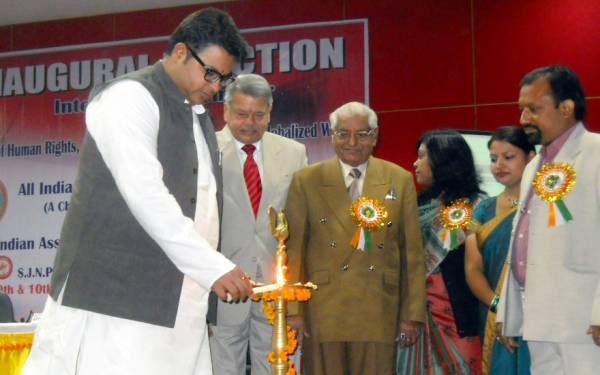“Right is the Soul of Life”
To live in a certain geographia does not manifest one’s right to be a true/real citizen of that country. The Law or Constitution of a country decides only parameters of citizenship and if any one fulfils it, he/she may be a legal citizen of that country, but ethics, values and self consciousness are some other parameters which decide whether a person has/ has not the quality to be a citizen of that country.
If a person, who lives in a country gets job, livelihood and protection but does not know his/her right in that country, may be subjected to violence of some kind or the other. In general practice when we talk about common law which empowers a person as real citizen, almost every person denies to have any concern with it. And that is the reason why we find dozens of stories of Human Rights Violation across the country and at the global level as well. To lead a life of equality and dignity, one needs to adhere to common features of Human Rights as described in the Charter of United Nation Organisation (UNO). The tenets of Human Rights of UNO may or may not have been incorporated by any country of this globe according to their law and constitution for the protection of Human Rights.
The right to live with human dignity and freedom is a God given gift to every person born on this blue planet. This realization of people all over the globe led to the Universal Declaration of Human Rights 1948. Several other declarations were later made to protect the social, economic, cultural, civil political rights and the dignify of the people all over the world. A very large of the members of the U.N., including India, are signatories to implement these declarations.
These agreements were not fully honored by Indian Government in the past while dealing with internal conflicts, agitations, political unrest and terrorism. The growing militarization and authoritarianism in the country deprived many of the people of their basic Human Rights. Violation of Human Rights by the state and its agents were severely by Human Rights Organizations inside and outside the country and nations in the west. This situation has forced the Government to establish a Human Rights Commission to deal with matters related to violation of Human Rights. For this purpose a new law “The Protection of Human Rights Act” was enacted in 1993.

Human Rights in its simplest description is inalienable and inherent rights of human beings irrespective of caste, creed, color, sex etc. Due to increasing population and lack of resources culture failed to fulfill the needs of its people, causing class and caste conflicts, poverty, starvation, unemployment, genocide etc. All this led to emergence of human right on the global level. The term human right was coined to fulfill the basic needs of human beings such as food, sex and protection. Later on human right developed into a mega culture to fulfill the needs of people at the global level irrespective of race, sex, class, caste language, religion, culture, geography etc. Up till now what was being done by a culture for the people of its group now came to be done through the advocacy of human right at a wider level. If we look from the point of view of human right we find infringement of human right in different cultural societies in the form of discriminations of race, sex, caste, class, religion, language, economy etc.
India, sandwiched between developed and developing country, still needs to ensure Right to Life, Right to Shelter, Right to Health etc to its people including children, women, youth, old, disabled etc. Now the time is ripe for creating awakening and awareness amongst people to know the main rules regulations, constitutional safeguards, statutory law for the protection of Human Rights.
In India where most of the Indians are literate but not educated, is very difficult to establish a society which is aware and conscious towards its Human Rights. All Indian Rights Organisation (AIRO) is making sincere efforts and trying to make aware people for their Human Rights since 12th Nov 2006. Its main thrust is to inseminate knowledge about the followings–
- Fundamental Rights as enshrined in Indian Constitution
- Provisions of Universal Declaration of Human Rights (UDHR), 1948
- Human Rights Protection Act 1993 in India.
- Right to Information Act 2005 in India.
If a person knows all these four pillars of Human Right, he/she may have a concrete and real base for living a dignified life in this country.